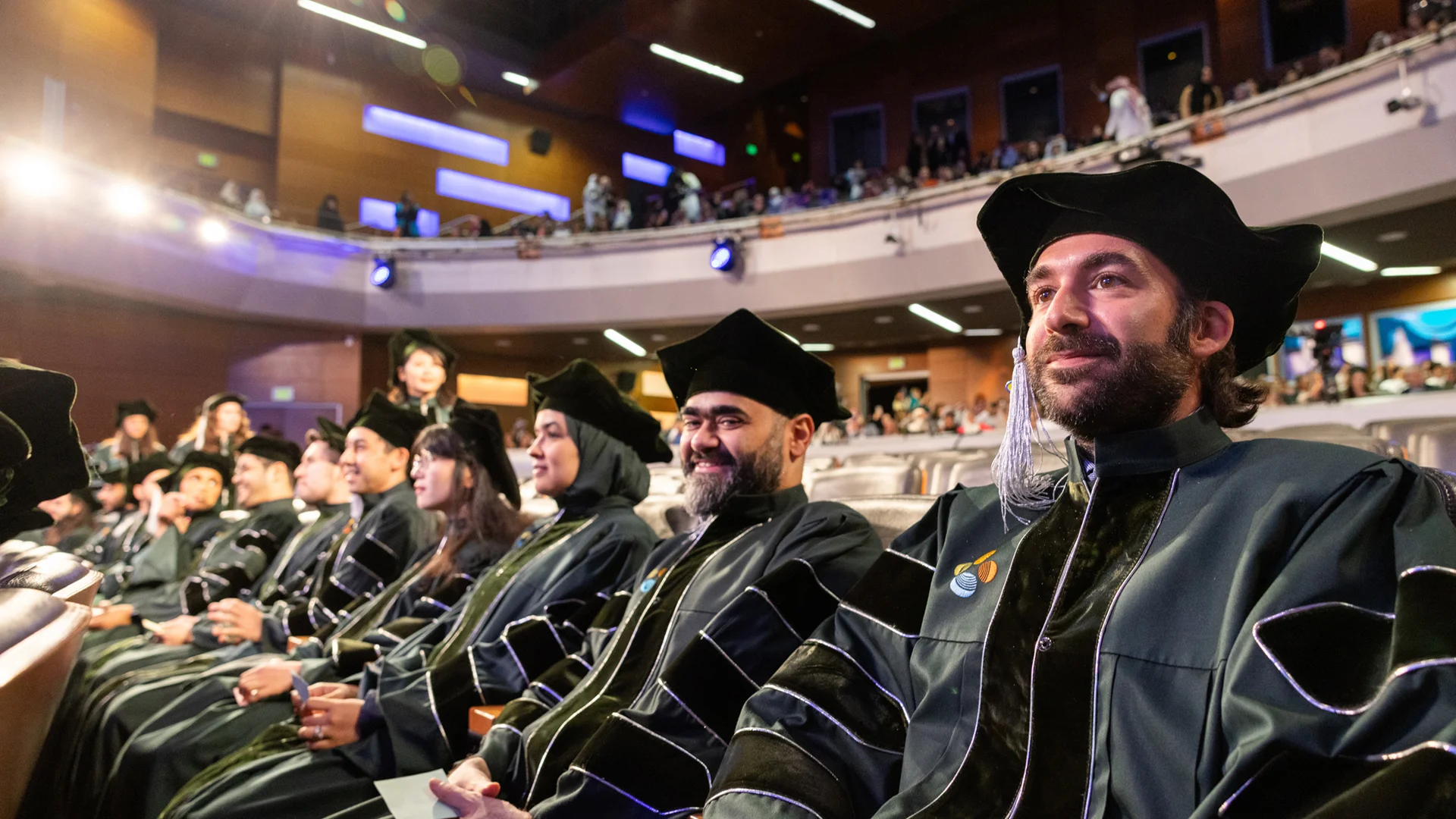
Graduate Student Milestones and Guidelines
This page outlines the step-by-step process and key requirements for CEMSE master’s and Ph.D. students preparing for thesis or dissertation milestones—including committee formation, proposal and defense submissions, and final archiving.
Students should contact their Graduate Program Student Advisor (GPSA) with any questions. Deadlines are listed on the Registrar’s Office academic calendar, including:
- Last day to submit a petition for thesis or dissertation defense
- Last day to submit defense results
- Last day to archive the final thesis or dissertation
On This Page
- CEMSE Graduate Program Student Advisors
- Program Timeline
- Milestone Process and Guidelines
- Master’s Thesis Defense Process
- Ph.D. Proposal Defense Process
- Ph.D. Dissertation Defense Process
Note
This page is provided as a reference. Students should always consult the Program Guide corresponding to their year of admission for official and up-to-date information regarding their degree requirements and milestones.
CEMSE Graduate Program Student Advisors
Your Graduate Program Advisor is your main point of contact in CEMSE for academic support during your studies at KAUST. They work with faculty, staff and the Registrar’s Office to help you monitor your academic progress, meet program requirements, and connect with helpful resources.
Keeping in touch with your advisor throughout your studies will help you make the most of your academic journey.
Program Timeline
KAUST has distinct milestone timelines for students based on when they started their degrees. Please review the section that applies to your enrollment date.
Students Who Started Before Fall 2023
Note: The term “semester” refers to Fall, Spring or Summer.
Qualifying Exam
- Ph.D. students: Must pass within 4 semesters.
- M.S./Ph.D. students: Must pass within 7 semesters.
Proposal Defense
- Ph.D. students: Must pass within 7 semesters.
- M.S./Ph.D. students: Must pass within 11 semesters.
Duration
- Ph.D. students: Must complete the degree within 5 years (possible extension: up to 2 years).
- M.S./Ph.D. students: Must complete both degrees within 6 years (possible extension: up to 1 year).
Additional Details
- One approved extension request = one semester. A 1-year extension requires three separate approvals.
- Extensions must be approved by the Associate Dean on behalf of the Dean.
- Students who do not complete their degree by the final approved extension will receive a dismissal notice with the option to appeal to the Academic Performance Committee (APC).
- Missing a milestone deadline places a student on probation for one semester. Failure to complete the milestone during this period results in dismissal, with the option to appeal to the APC.
Students Who Started in Fall 2023 and After
M.S. Students and M.S./Ph.D. Students (during the M.S. degree studies)
Note: The term "semester" refers to Fall and Spring only.(excluding Summer)
Duration
Master’s students are expected to complete their degree within a defined timeline, which varies by program track (thesis or non-thesis) and the semester in which they start (Fall or Spring). The timelines below outline the typical progression. An extension beyond the standard duration may be requested once, either for an additional semester or a summer session.
Fall Cohort
M.S. Non-Thesis (3 semesters + 1 summer): Students admitted in Fall are expected to complete their degree across three consecutive semesters and one summer session.
Typical progression: Fall (1) → Spring (2) → Summer → Fall (3)
M.S. Thesis (4 semesters + 1 summer): Students admitted in Fall are expected to complete their degree across four semesters and one summer session. If required, a single extension (summer) may be applied for.
Typical progression: Fall (1) → Spring (2) → Summer → Fall (3) → Spring (4) [+ optional summer extension]
Spring Cohort
M.S. Non-Thesis (3 semesters + 1 summer): Students admitted in Spring are expected to complete their degree across three semesters and one summer session.
Typical progression: Spring (1) → Summer → Fall (2) → Spring (3)
M.S. Thesis (3 semesters + 2 summers): Students admitted in Spring are expected to complete their degree across three semesters and two summer sessions. If required, a single extension (semester or summer) may be applied for.
Typical progression: Spring (1) → Summer → Fall (2) → Spring (3) → Summer [+ optional Fall extension]
- M.S. thesis application must be submitted by the end of the first week of the 3rd semester.
Additional Details
- Extensions must be approved by the Associate Dean on behalf of the Dean.
- Failure to complete the M.S. within the extension period results in a dismissal notice, with the option to appeal to the APC.
Ph.D. Students (including M.S./Ph.D. students after M.S. completion)
Qualifying Exam
- Ph.D. students: Must pass by the end of the 3rd semester.
- M.S./Ph.D. students may complete this requirement during their M.S. phase.
Proposal Defense
- Must pass by the end of the 5th semester.
Duration
- Complete the Ph.D. within 4 years (extension: up to 1 year).
Additional Details
- One approved extension = one semester or summer session. A 1-year extension requires three separate approvals.
- Extensions must be approved by the Associate Dean on behalf of the Dean.
- Failure to meet the final deadline results in dismissal, with the option to appeal to the APC.
- Failure to meet any milestone on time will result in immediate dismissal, with the option to appeal to the APC.
Milestone Process and Guidelines
Master’s Thesis Defense Process

1.
Initiate the Process

2.
Share Your Thesis

3.
Post-Defense Steps
1. Initiate the Process
To begin the defense process, submit the following to your GPSA in a single email no later than the deadline listed on the academic calendar:
- M.S. Thesis Defense Petition Form: for this you need to form your thesis committee. See the Master’s Thesis Committee Formation Guidelines for composition requirements.
Complete the Registrar's M.Sc. Thesis and Ph.D. Defense Petition Form and list all committee members. Submit it to your GPSA no later than the “last day to submit M.S. thesis defense petition” listed in the academic calendar. The GPSA will circulate the form for signatures. - Abstract of Your Thesis
- Your Transcript
2. Share Your Thesis
- Share your thesis: Once your committee is approved, share your thesis with all committee members at least three weeks before the scheduled defense date. Late submissions may result in rescheduling your defense.
3. Complete the Post-Defense Steps
- M.S. Thesis Defense Result Form
Complete all sections (including committee members name) on the M.S. Thesis / Ph.D. Result Form and share it with your GPSA for further processing. This step should be completed three days from your defense date or on "the last day to submit the M.S. thesis defense result" as stated on the academic calendar. - Turnitin Report and Advisor Approval
After sending the Turnitin report to your advisor, you can initiate their final approval using this online form. This is needed to start the archiving process for your thesis. - ORCID Registration
Create your ORCID iD at orcid.kaust.edu.sa. - Final Thesis Archiving
Submit your thesis to the KAUST Repository within 15 days of your defense or by the final archiving deadline, whichever comes first.
For more details, refer to the step-by-step user guide or contact your GPSA.
Master’s Thesis Committee Formation Guidelines
The M.S. thesis defense committee must include a minimum of three members and may have up to four members. The composition of the committee is outlined as follows:
| Member | Role | Affiliation |
|---|---|---|
| 1 | Faculty | Primary affiliation within the student’s program |
| 2 | Faculty | Primary affiliation within the student’s program |
| 3 | Faculty | Primary affiliation outside of the student’s program |
| 4 | Faculty or research scientist (optional) | Affiliation within or outside of KAUST |
Notes
- The committee must be approved by the Dean.
- Members 1-3 are mandatory, while member 4 is optional.
- The student’s advisor serves as the chair of the committee. If the advisor holds a primary affiliation within the student’s program, then they act as member 1. If the advisor has a secondary or one-time affiliation within the student’s program, then they act as member 3.
- The student’s co-advisor may serve as member 4.
- Professors of Practice and Research Professors may serve as members 1-4, depending on their affiliation and whether they are the student’s advisor or co-advisor.
- Adjunct Professors and Professors Emeriti may continue serving on committees in the roles they had at the time of their departure but are not permitted to serve on new committees.
- Visiting Professors may only serve as member 4.
- Once approved, any changes to the committee require the approval of both the student's advisor and the Dean.
Ph.D. Proposal Defense Process

1.
Initiate the Process

2.
Share With Committee

3.
Post-Defense Steps
1. Initiate the Process
Start by reviewing your admitted year Program Guide to determine your proposal timeline.
To begin the defense process, form your dissertation committee and submit the following to your GPSA in a single email two weeks before your proposal defense:
- CEMSE Petition for Ph.D. Proposal Defense form and list all committee members. See the Ph.D. Dissertation Proposal Committee Formation Guidelines for composition requirements.
- Abstract of your thesis in a word document or a PDF file
2. Share With Committee
Once your committee is approved, your next step is to prepare and submit your proposal. This stage includes both a written and oral component:
- Written Proposal: A 10-page (suggested length) proposal describing the proposed topic of research, relevant survey of the literature and any preliminary results or laboratory preparation. This should be submitted to the examining committee at least 10 days prior to the scheduled presentation.This should be submitted to your examining committee at least 10 days prior to the scheduled presentation.
- Oral Presentation: Approximately 30 minutes on the dissertation topic presented to the examining committee, followed by questions to cover a total period of an hour.
3. Complete the Post-Defense Steps
Complete all sections (including committee members name) on the Result of Ph.D. Research Proposal Examination Form and share it with your GPSA for further processing. This step should be completed three days from your defense date or on "the last day to submit the M.S. thesis defense result" as stated on the academic calendar.
Ph.D. Dissertation Proposal Committee Formation Guidelines
The Ph.D. proposal defense committee must include a minimum of three members and may have up to four members. The composition of the committee is outlined as follows:
| Member | Role | Affiliation |
|---|---|---|
| 1 | Faculty | Primary affiliation within the student’s program |
| 2 | Faculty | Primary affiliation within the student’s program |
| 3 | Faculty | Primary affiliation outside of the student’s program |
| 4 | Faculty or research scientist (optional) | Affiliation within or outside of KAUST |
Notes
- The committee must be approved by the Dean.
- Members 1-3 are mandatory, while member 4 is optional.
- The student’s advisor serves as the chair of the committee. If the advisor holds a primary affiliation within the student’s program, then they act as member 1. If the advisor has a secondary or one-time affiliation within the student’s program, then they act as member 3.
- The student’s co-advisor may serve as member 4.
- Professors of Practice and Research Professors may serve as members 1-4, depending on their affiliation and whether they are the student’s advisor or co-advisor.
- Adjunct Professors and Professors Emeriti may continue serving on committees in the roles they had at the time of their departure but are not permitted to serve on new committees.
- Visiting Professors may only serve as member 4.
- Once approved, any changes to the committee require the approval of both the student's advisor and the Dean.
- Members of the proposal defense committee are required to remain on the dissertation defense committee. Any exceptions to this requirement must be approved by both the student’s advisor and the Dean.
Ph.D. Dissertation Defense Process

1.
Initiate the Process

2.
Submit Defense Announcement

3.
Post-Defense Steps
Please consult your Graduate Program Student Advisor (GPSA) if any part of the process is unclear. Be sure to check the academic calendar on the Registrar’s Office website for key deadlines, including:
- Last day to submit Ph.D. defense petition
- Last day to submit Ph.D. defense result
- Last day to archive Ph.D. dissertation
1. Initiate the Process
- When you are ready to defend your Ph.D., submit the Petition for Ph.D. Dissertation Defense form no later than the deadline listed in the academic calendar. See the Ph.D. Dissertation Defense Committee Formation Guidelines for composition requirements.
- Once your petition is approved, you must share your dissertation with the internal committee members as early as possible.
- Do not proceed with the defense until your advisor confirms:
- They have received the external examiner’s evaluation report, and
- They have reviewed and approved the final version of your dissertation.
- Submit any updates to your dissertation (if changes were made after your petition). Revised versions must be shared with the internal committee and clearly highlighted.
- If your external examiner is participating remotely, set up a Zoom link and share it with them ahead of the defense.
No dissertation will be accepted without your advisor’s confirmation that it is ready for submission to the dean and the external examiner.
2. Submit the Defense Announcement
- At least two weeks before the scheduled defense date, complete the following:
- Send defense details tocemse@kaust.edu.sa for the announcement, including:
- Thesis title
- Abstract
- Brief biography
- Date and time of the defense
- Location (e.g., Building 1, Level 1, Room 1111)
- Name of your academic advisor
- A high-resolution photo Minimum size: 1920×1080 (preferred: 3840×2160). If your CEMSE faculty/student profile already has a suitable image, no new photo is needed. If not, please schedule a photo session by emailing cemse@kaust.edu.sa.
3. Complete the Post-Defense Steps
- Ph.D. Defense Result Form
Complete the Ph.D. Defense Result Form with your details and list of committee members. Submit it to your GPSA for signature circulation within three calendar days of your defense or by the official deadline—whichever comes first. - Final Approval
After sending your Turnitin report to your advisor, initiate their approval using this online form. This is needed to start the archiving process for your dissertation. - ORCID Registration
Create your ORCID iD at orcid.kaust.edu.sa. - Submit to KAUST Repository
Upload your dissertation to the KAUST Repository within 15 days of your defense or by the academic calendar’s archiving deadline—whichever comes first. - For more details, refer to the step-by-step user guide or contact your GPSA.
Ph.D. Dissertation Defense Committee Formation Guidelines
The Ph.D. dissertation defense committee must include a minimum of four members and may have up to five members. The composition of the committee is outlined as follows:
| Member | Role | Affiliation |
|---|---|---|
| 1 | Faculty | Primary affiliation within the student’s program |
| 2 | Faculty | Primary affiliation within the student’s program |
| 3 | Faculty | Primary affiliation outside of the student’s program |
| 4 | External examiner | Affiliation outside of KAUST |
| 5 | Faculty or research scientist (optional) | Affiliation within or outside of KAUST |
Notes
- The committee must be approved by the Dean.
- Members 1-4 are mandatory, while member 5 is optional.
- The student’s advisor serves as the chair of the committee. If the advisor holds a primary affiliation within the student’s program, then they act as member 1. If the advisor has a secondary or one-time affiliation within the student’s program, then they act as member 3.
- The student’s co-advisor may serve as member 5.
- Professors of Practice and Research Professors may serve as members 1-3 or 5, depending on their affiliation and whether they are the student’s co-advisor. They cannot be the advisor of the student and cannot serve as the chair of the committee.
- Adjunct Professors and Professors Emeriti may continue serving on committees in the roles they had at the time of their departure but are not permitted to serve on new committees.
- Visiting Professors may only serve as member 5, but they are not permitted to serve as external examiner.
- Guidelines for selecting the external examiner can be found here.
- Once approved, any changes to the committee require the approval of both the student's advisor and the Dean.
Have a question about the process?
If you have any questions, please do not hesitate to contact the Registrar Help Desk and/or your GPSA. Please also see the step-by-step user guide describing the archiving process.


